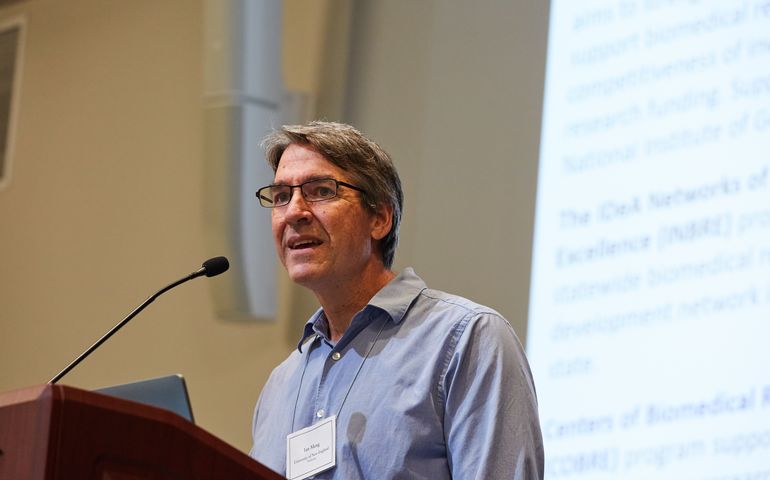UNE researchers will see eye problems through a better lens, thanks to $6.6M grant
 Courtesy / University of New England
Ian Meng, director of UNE's Center for Biomedical Excellence for the Study of Pain and Sensory Function, will lead a five-year research project looking at the causes of ocular pain.
Courtesy / University of New England
Ian Meng, director of UNE's Center for Biomedical Excellence for the Study of Pain and Sensory Function, will lead a five-year research project looking at the causes of ocular pain.
The University of New England has received a $6.6 million grant that could pave the way for new, more effective treatments for eye pain.
The five-year research grant was awarded by the National Eye Institute, a division of the National Institutes of Health, in Bethesda, Md., UNE announced Monday.
A team led by Ian Meng, director of UNE's Center of Biomedical Research Excellence for the Study of Pain and Sensory Function, will use the funds to study changes to the corneal nerves in response to injury and chronic dry eye, both of which Meng describes as serious clinical problems.
"The cornea is the most densely innervated structure in your entire body, and, as such, it is exquisitely sensitive to anything that can be potentially damaging to your eye," Meng said. "Because vision is so important to everything that we do, the nerves in the cornea are there to protect your eye and keep them from getting damaged."
Meng will collaborate on the project with colleagues in Boston who are based at Tufts University School of Medicine and Brigham and Women's Hospital.
In the first part of the study, researchers will create a detailed map of the nerves supplying the cornea, and later explore how an injury to those nerves affects the brain's emotional responses to trauma.
The research may also help explain why headaches, migraines and other types of chronic pain are so closely related to eye pain, and why they cause such severe emotional reactions.
Meng said the grant is unique because the National Eye Institute is funding several research groups that will regularly convene to discuss their progress, findings and methodologies. He described the approach as a novel, transparent method of scientific inquiry.
"This is a bold initiative from the National Eye Institute," Meng said. "Oftentimes, scientists will develop their own techniques and keep the details to themselves." With this project, "we're all trying to advance the field in collaboration with each other. I'm very much looking forward to learning from those other groups and possibly applying what I learn to the science that I do."
UNE is a private university, with campuses in Portland, Biddeford and Tangier, Morocco. The school was ranked No. 5 on a list of Maine's largest college and universities in the 2022 Mainebiz Book of Lists, ranked by full-time undergraduate enrollment in fall of 2021.














0 Comments